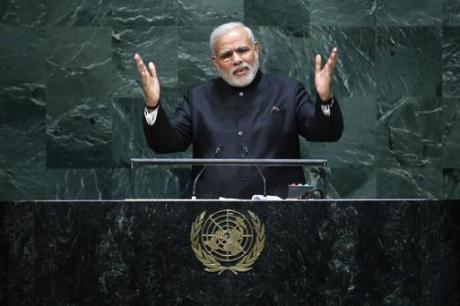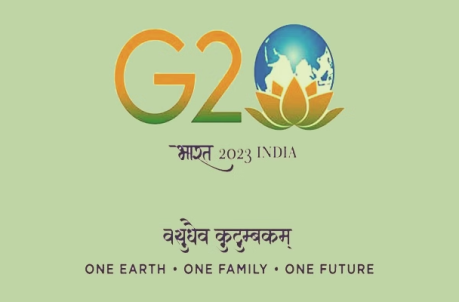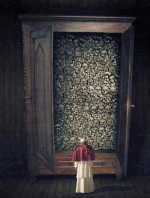
“This is my own and that a stranger” is the calculation of the narrow-minded;
For the magnanimous-hearts however, the entire earth is but a family.
If we study the original sources for the shloka ‘vasdhaiva kutumbakam’, it becomes amazingly apparent that its popular understanding is simply flawed, and its application in matters of policy is the height of ignorance. The Vedas did not propagate vasudhaiva kutumbakam, nor does this shloka really mean what is commonly understood. In general, surprising as it might seem, Sanskrit sources—not Vedas—that presented vasudhaiva kutumbakam are actually warning AGAINST the tendency to preach universal brotherhood! – Sarvesh K. Tiwari (with edits)
If a survey of the saMskR^ita verses most quoted in the modern times were undertaken, the above would certainly secure the top rank. Along with its short form ‘vasudhaiva kuTumbakam’, this shloka somehow finds a massive popularity among the modern Hindus. Of late though, the secular variety seems to have developed quite a fetish for it and the verse has gained a rhetorical note. Apparently it offers them an aesthetic emblem of multiculturalism and universalism, as well as an authority of yore to denounce the nationalistic thought as narrow-minded. Even the most saMskR^ita-phobic ones therefore can be seen reciting this shloka on every sundry occasion.
While we can site several examples of its interesting usage, we shall limit to the following few:
“… India that once, 2000 years ago, had proclaimed vasudeva (sic) kutumbakam—the world is one family, …” — Ms. Sonia Gandhi in her acceptance speech on occasion of being conferred the “Grand Officer of the Order of Leopold” by Belgian government for her “constructive nationalism and efforts to foster a multicultural, tolerant society in India”, on November 11, 2006 at Centre for Fine Arts, Brussels.
And:
“In ancient India the liberal perspective was defined by the concept of Vasudhaiva Kutumbakam … in contradiction to the ‘Clash of Civilizations’… the theory I don’t agree with. We have to reclaim that liberal space.” — Dr. Manmohan Singh, the Prime Minister of India, address to the Harvard Alumni Association, March 25, 2006 at New Delhi.
The shloka of vasudhaiva kuTumbakam being sited to propose it as a contrasting paradigm to the Samuel Huntington’s theory of Clash of Civilizations, is both iconic and profound. The shloka is invoked by the speakers to show their liberalist Nehruvian internationalism to be a continuity of the ancient Hindu paradigm; the appeal is made to the Hindu past for approval and attestation of their ideology; and claim is laid to be the legitimate heir of the continuity of the ancient thought process and legacy.
Had it been limited to the shloka’s popularity among the speech-writers to add some aesthetic value to the speeches, not much harm done. But what is much more profound comes in the following:
Speaking in Rajya Sabha on December 5, 2007, the Union Minister for External Affaires Mr. Pranab Mukherjee made it very unambiguous when he jubilantly declared:
“Vasudhaiva Kutumbakam is our foreign policy.”
Indeed, Vasudhaiva Kutumbakam has also become an unchallenged cornerstone of India’s official policy-making since independence, as has been officially proclaimed so on several occasions. No wonder that as a symbolic reflection, Vasudhaiva Kutumbakam has been literally inscribed in stone, on the walls of the India’s Parliament House.
Now, thanks to the continuous rhetoric, traditional Hindus too seem to have taken to this shloka like a duck to the water. Vasudhaiva Kutumbakam is often cited by them as an evidence of how the ancient sages had set for themselves, and for generations thereafter, the principles of an unconditional universal brotherhood. It has been generally taken for granted that Vasudhaiva Kutumbakam is of unquestionable value, a traditional nIti recommended by wise ancestors of how to deal with the world. We can notice the shloka being quoted uncritically not only by Hindutva ideologues in their writings and speeches but also popular religious leaders in their discourses without getting tired.
However, this prominence of Vasudhaiva Kutumbakam in the modern public discourse springs from a superficial or even a perverted understanding. If we study the original sources which recited it in the first place, it becomes amazingly apparent that its popular understanding is simply blundered, and its application in the matters of policy is a height of ignorance and squarely flawed.
Links to all Tiwari’s Vasudhaiva Kutumbakam articles:
1 – The Hoax Called Vasudhaiva Kutumbakam (Hitopadesha)
2 – The Hoax Called Vasudhaiva Kutumbakam (Panchatantra & Kautilya)
3 – The Hoax Called Vasudhaiva Kutumbakam (Vikrama, Poetics & Upanishada)
Filed under: india | Tagged: indian politics, nehruvian secularism, sanskrit literature, self-deception, vasudhaiva kutumbakam |




























Vasudeva Kutumbakam must not be used, because contextually it was a hoax. If Modi wishes, he can quote the adage of Tamil literature, YAADUM OORE YAAVARUM KELIR – All places are our own , all are real test, relatives, interconnected. He can probably prove himself a pan Indian, not parochial.
LikeLike
Modi must not use the phrase “vasudeva kutumbakkam” as it was not sourced from Vedas but a hoax in the Panchatantra stories.
Instead, as an Indian, he should or may wish to quote from the famous Tamil literature of vedic status (Pura-nanuru): Yaadum Oore Yavarum Kelir – meaning all places on this planet/universe are mine, and all are related, relatives or interconnected.
Here is the rendering in Tamil and English translation by a nice guy:
யாதும் ஊரே ; யாவரும் கேளிர் ;
தீதும் நன்றும் பிறர்தர வாரா ;
நோதலும் தணிதலும் அவற்றோ ரன்ன ;
சாதலும் புதுவது அன்றே ; வாழ்தல்
இனிதுஎன மகிழ்ந்தன்றும் இலமே; முனிவின்,
இன்னா தென்றலும் இலமே; ‘மின்னொடு
வானம் தண்துளி தலைஇ, ஆனாது
கல்பொருது இரங்கும் மல்லற் பேர்யாற்று
நீர்வழிப் படூஉம் புணைபோல, ஆருயிர்
முறைவழிப் படூஉம்’ என்பது திறவோர்
காட்சியின் தெளிந்தனம் ஆகலின், மாட்சியின்
பெரியோரை வியத்தலும் இலமே;
சிறியோரை இகழ்தல் அதனினும் இலமே.
எட்டுத்தொகை நூல்களில் ஒன்றாகிய
புறநானூறு. 192 – பாடியவர்: கணியன் பூங்குன்றன்
My Translation :
All are our place; every one is our relatives,
Bad & Good does not come from others,
Similarly pain & relief as well,
Death is not new at all, we neither
Feel proud to live, nor
Feel distress to end, like the
Water fall from sky as stone after lightening
Thunder, though clean and colourless, after touching
The earth takes the colour and quality of the place of fall,
And run with river, Our life also takes shape depending upon circumstances
And these facts realised & understood by the learned elders,
And hence we don’t flatter privileged and more than that
We don’t snuff the disadvantaged!
LikeLike
yes sir , these long-forgotten wise sayings & their context should be repeatedly published , explained ;
LikeLike
This excellent article by Sarvesh Tiwari is now several years old but it needs to be republished again and again for public good. JPS
LikeLike